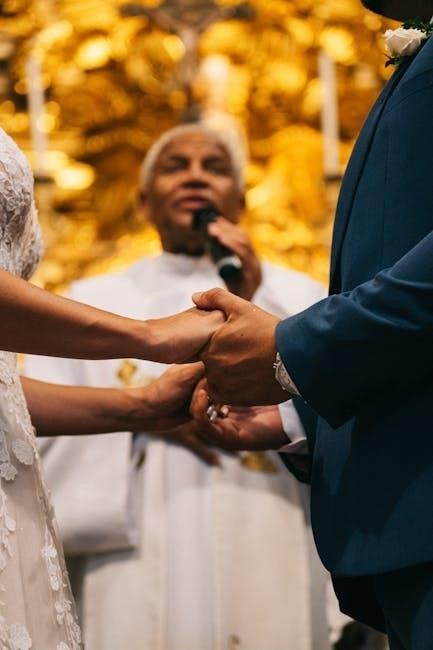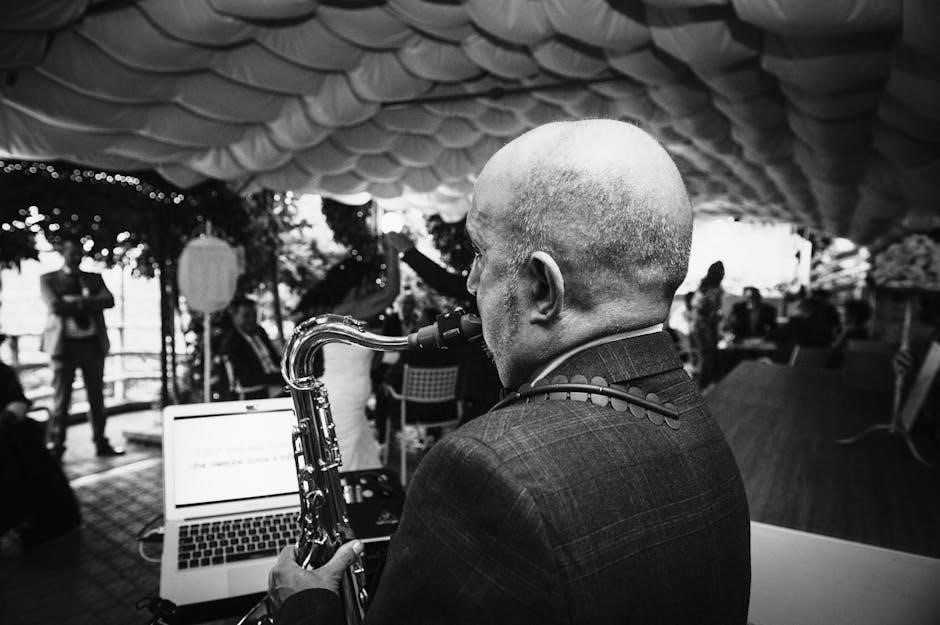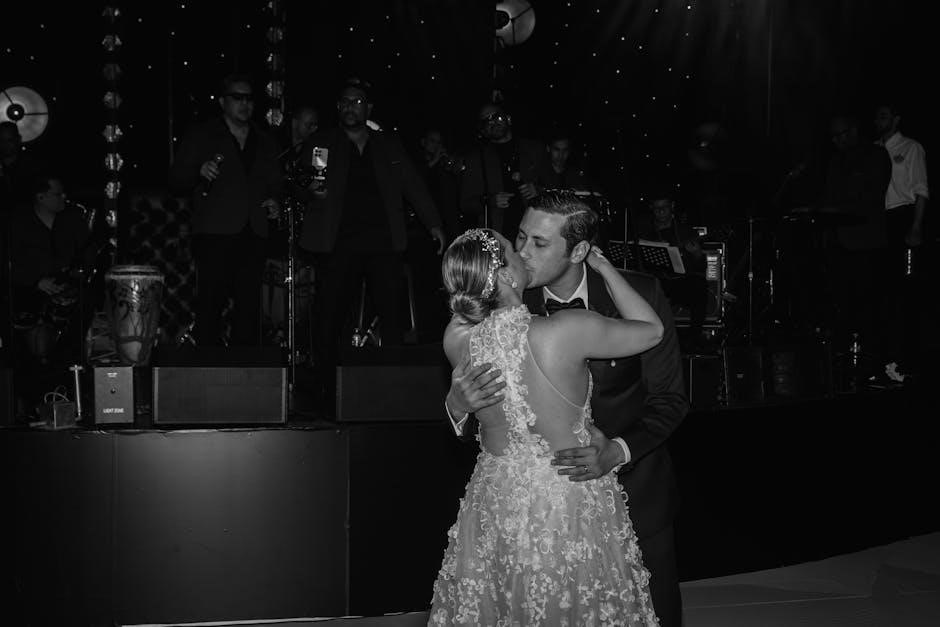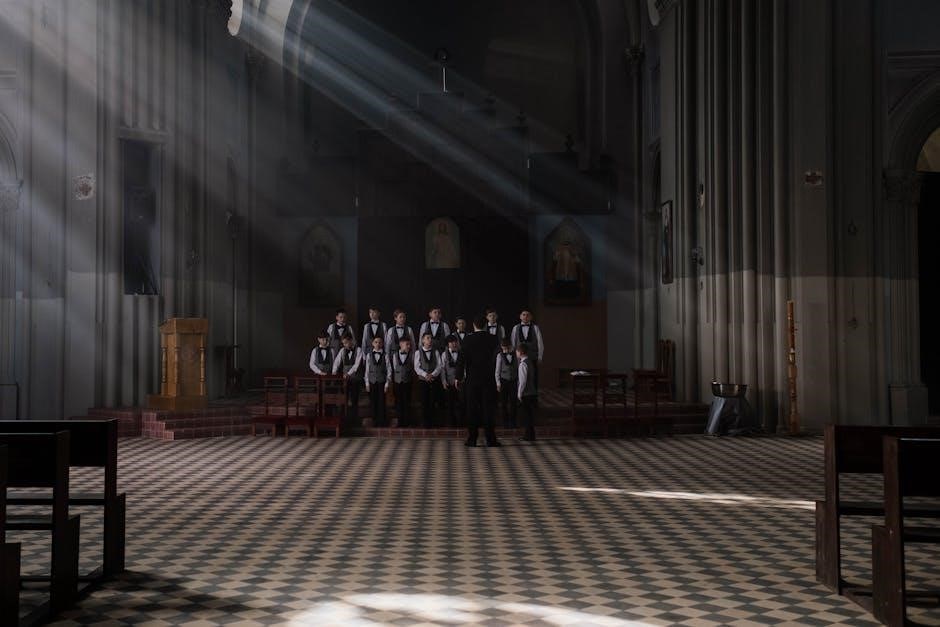Catholic wedding music is a timeless blend of tradition and devotion, reflecting the sacred nature of the ceremony. This guide helps couples choose meaningful and appropriate selections.
Overview of the Importance of Music in Catholic Weddings
Music plays a vital role in Catholic weddings, creating a sacred and reverent atmosphere. It enhances the spiritual dimension of the ceremony, drawing participants into worship and reflection. Sacred music reflects the divine love and commitment mirrored in the union of husband and wife, grounding the celebration in faith and tradition. Carefully chosen music elevates the liturgy, ensuring the ceremony remains a profound expression of devotion and joy.
Key Considerations for Choosing Appropriate Music
Choosing music for a Catholic wedding requires careful thought to ensure it aligns with liturgical guidelines and enhances the sacred nature of the ceremony. Sacred music should be prioritized, reflecting the divine and fostering worship. The involvement of a trained music director or cantor is crucial to maintain the integrity of the liturgy. Balancing traditional and contemporary pieces can create a meaningful experience, while ensuring all selections uphold the dignity and reverence of the sacrament.
Traditional Music Choices for Catholic Weddings
Traditional Catholic wedding music emphasizes sacred and timeless selections, such as Gregorian chant and beloved hymns, to create a reverent and faith-filled ceremony atmosphere.
Gregorian Chant and Its Timeless Appeal
Gregorian chant, with its ancient and monastic sound, offers a timeless elegance to Catholic weddings. Its simple, sacred melodies create a reverent atmosphere, connecting the ceremony to centuries of tradition. Ideal for moments like the Processional or Communion, Gregorian chant embodies the spiritual essence of the occasion, providing a solemn and awe-inspiring backdrop for the celebration of marriage.
Beloved Traditional Catholic Wedding Hymns
Traditional Catholic hymns like “Joyful, Joyful, We Adore Thee” and “Ave Maria” are cherished for their profound lyrics and spiritual depth. These hymns, often sung during the Processional or Communion, beautifully express joy, faith, and devotion. Their timeless appeal resonates with both the couple and the congregation, enriching the ceremony with a sense of reverence and unity in celebration of the sacrament of marriage.

Budget Considerations for Wedding Music
Planning your wedding music budget involves balancing quality and affordability. Professional organists and singers vary in cost, with fees reflecting experience and location, ensuring a sacred and memorable ceremony.
Cost of Hiring Professional Musicians
Hiring professional musicians for a Catholic wedding can vary significantly based on location and expertise. Organists typically charge between $200-$300, while vocalists may range from $150-$250. Additional fees may apply for rehearsals, special requests, or travel. Budgeting $500-$700 for a small ensemble or soloist is common. Ensure to discuss your preferences and budget with the music director to find a balance between quality and affordability for your sacred ceremony.
Additional Fees for Special Requests
Additional fees may apply for special requests, such as hiring a guest cantor or instrumentalists. A $75 fee may be charged if the music director needs to rehearse separately with a guest cantor. Extra charges could also apply for specific instrumental arrangements or uncommon song requests. Be sure to clarify these costs upfront to avoid surprises and ensure all musical elements align with your vision and budget for the ceremony.
The Order of a Catholic Wedding Ceremony
A Catholic wedding ceremony typically includes the Entrance Rite, Liturgy of the Word, Sacrament of Marriage, and optionally, the Eucharist, concluding with the Recessional.
Music for the Entrance Rite and Processional
The Entrance Rite and Processional set the tone for the ceremony, often featuring traditional hymns like O Mary of Graces or The Maginificat. These selections create a reverent atmosphere, guiding the congregation into a spirit of worship. Classical pieces such as Canon in D by Pachelbel or Bach’s Arioso are also popular, blending elegance with sacred tradition. The music chosen should reflect the dignity and joy of the occasion, while aligning with Catholic liturgical guidelines.
Appropriate Music for the Communion
Communion music in a Catholic wedding is deeply sacred, often featuring traditional hymns or chants. Pieces like Ave Maria or Pie Jesu are commonly chosen for their reverent and contemplative nature. Latin hymns, such as Panis Angelicus, are also popular, emphasizing the Eucharistic significance. The music should foster prayerful reflection, aligning with the solemnity of the sacrament. Secular or upbeat songs are typically avoided during Communion to maintain the sacred atmosphere.
Recessional Music to Conclude the Ceremony
Recessional music marks the joyful conclusion of the Catholic wedding ceremony, celebrating the newlyweds’ union. Traditional choices like Mendelssohn’s Wedding March or Joyful, Joyful, We Adore Thee are popular for their uplifting and triumphant tones. Instrumentation such as trumpets or a full choir can enhance the festive atmosphere. The music should reflect the happiness of the occasion while maintaining reverence, ensuring a memorable exit for the couple and a celebratory send-off for the congregation.

Instrumentation and Vocals in Catholic Weddings
The organ, piano, strings, and brass are common instruments, while vocals by a cantor or choir add sacred depth, enhancing the ceremony’s reverent atmosphere and spiritual significance.
Recommended Instruments for Sacred Music
Traditional instruments like the organ, piano, strings, and brass are often used in Catholic weddings. The organ is a staple in church services, providing a solemn and majestic sound. Strings, such as violins or harps, add elegance and emotion, while brass instruments like trumpets can emphasize joyful moments. Flutes and acoustic guitars may also be incorporated for softer, intimate pieces. These instruments create a reverent atmosphere, aligning with the sacred nature of the ceremony.
Role of the Cantor and Choir
The cantor plays a vital role in leading the congregation and singing liturgical parts, such as the Gospel acclamation and responsorial psalm. Their voice must be clear and strong to guide the assembly in worship. The choir supports the congregation, enriching the ceremony with harmonious singing of hymns and sacred songs, creating a reverent atmosphere. Both cantor and choir ensure the liturgy remains focused on prayer and devotion.

Selecting Sacred vs. Secular Music
Sacred music reflects the ceremony’s sacred nature, while secular music may not align with liturgical guidelines. The Church emphasizes sacred choices to maintain reverence and focus on worship.
Guidelines for Choosing Sacred Music
Sacred music is essential for maintaining the liturgical integrity of a Catholic wedding. It should reflect the sacred nature of the ceremony and align with the Church’s teachings. When selecting sacred music, consider the liturgical, musical, and pastoral appropriateness of each piece. The music should evoke prayer, worship, and a sense of community. Avoid secular or love songs that do not align with the sacrament’s reverence. Always consult with your parish music director to ensure choices meet liturgical guidelines and reflect the couple’s faith journey.
- Choose music that enhances prayer and worship.
- Ensure selections are liturgically appropriate for the ceremony.
- Exclude secular love songs that don’t reflect God’s love.
When Secular Music May Be Appropriate
Secular music is generally discouraged during the liturgical parts of a Catholic wedding, as the focus should remain on sacred worship. However, secular songs may be appropriate during non-liturgical moments, such as the prelude, recessional, or reception. These selections should still reflect dignity and faith, avoiding lyrics that contradict Catholic teachings. Couples should consult their music director to ensure any secular choices align with the ceremony’s sacred nature and maintain reverence.
- Use secular music sparingly and outside the liturgical rite.
- Ensure secular songs reflect dignity and faith values.
- Seek approval from the music director for all selections.

Modern vs. Traditional Music
Catholic weddings often blend modern and traditional music, creating a balance between timeless classics and contemporary pieces that reflect the couple’s personal style while honoring sacred traditions.
Blending Contemporary and Traditional Pieces
Blending contemporary and traditional music creates a harmonious balance, respecting the sacred nature of the ceremony while reflecting the couple’s personal style. For example, a modern song during the prelude or Communion can complement traditional hymns during the processional or recessional. This approach ensures the liturgy remains reverent while incorporating meaningful, modern elements that resonate with the couple and their guests. The key is to maintain the sacred atmosphere while infusing personal touches that make the ceremony unique.
Popular Modern Songs for Catholic Weddings
Modern songs like “Ave Maria” by contemporary artists or “I Choose You” by Sara Bareilles are increasingly popular in Catholic weddings. These pieces blend emotional depth with reverence, making them suitable for moments like the Communion or recessional. Christian songs such as “The Prayer” or “Unchained Melody” also resonate well, offering a personal touch while maintaining the ceremony’s dignity. These selections reflect the couple’s style while honoring the sacred nature of the occasion.

Alleluia and Gospel Acclamations
The Alleluia is a joyful proclamation before the Gospel, essential in Catholic weddings. The Celtic Alleluia is a popular choice, offering a blend of tradition and uplifting melody.

The Significance of Alleluia in the Ceremony
The Alleluia holds profound significance in Catholic weddings, serving as a joyful proclamation of faith and celebration. Sung before the Gospel, it expresses the congregation’s delight in God’s Word and the couple’s union. This sacred chant unites tradition and devotion, creating a reverent yet uplifting atmosphere. The Celtic Alleluia, a popular choice, beautifully balances simplicity and emotion, reflecting the divine love at the heart of the ceremony.
Recommended Gospel Acclamations
Alleluia chants are a cherished tradition in Catholic weddings, expressing joy and reverence. The Celtic Alleluia is a popular choice, known for its simple yet powerful melody. Other recommended acclamations include the Lenten Gospel Acclamation, suitable for spring weddings, and the Easter Alleluia, celebrating renewal. These selections elevate the ceremony, connecting the congregation to the divine and enriching the liturgical experience with timeless beauty and spiritual depth.
Resources for Planning Your Wedding Music
Explore comprehensive guides, suggested playlists, and expert advice to help you select sacred and meaningful music for your ceremony. Consulting with your music director ensures harmony and tradition.
Suggested Playlists and Guides
Discover curated playlists and detailed guides to help you select appropriate music for your Catholic wedding. These resources often include traditional hymns, classical pieces, and sacred songs. Popular choices like Ave Maria, Panis Angelicus, and Pie Jesu are frequently recommended. Many churches provide suggested playlists to ensure the music aligns with liturgical guidelines. Online guides also offer tips for blending contemporary and traditional elements seamlessly. These tools are invaluable for creating a meaningful and reverent musical experience for your special day.
Consulting with Your Music Director
Consulting with your music director is essential for creating a cohesive and liturgically appropriate soundtrack for your Catholic wedding. They can guide you in selecting music that aligns with the ceremony’s sacred nature and offer expertise on traditional and contemporary options. Your music director can also coordinate rehearsals, manage logistics, and ensure all musical elements enhance the worship experience. Their insights will help you make informed decisions and create a meaningful musical experience for your special day.
Your Catholic wedding music should reflect the sacredness of the ceremony, blending tradition and personal touches. Thoughtful selection ensures a meaningful and reverent celebration of your union.
Final Tips for Creating a Meaningful Music Plan
Choose music that reflects the sacredness of the occasion, ensuring it aligns with Catholic liturgical traditions. Prioritize quality over quantity, selecting pieces that resonate emotionally and spiritually. Involve your music director early to ensure seamless execution. Balance traditional hymns with personal touches, maintaining reverence while expressing your unique love story. Remember, the music serves the liturgy, enhancing the celebration of your sacramental union.




